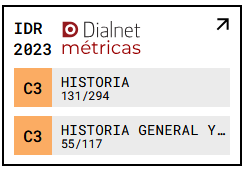Economy, enlightenment and liberalism: the “cortes” at cádiz
DOI:
https://doi.org/10.18172/brocar.1567Keywords:
Enlightenment, Liberalisme, The “Cortes” at Cadiz, Ancient Regime, EconomyAbstract
From the year 1788 onwards, new and singular historical circumstances (given the French and American revolutions, the publication of A. Smith’s works, the War Of independence, the colonial crisis…) allowed the possibility of creating a liberal government to become true. At the “Cortes” held in Cádiz, the collective subject, embodied in the concept of national sovereignty, succeeded the “philosopher” king in charge of reforms. The “Liberal Utopia” made parliamentarians believe that institutional change would be absolutely necessary towards economic recovery. It wouldn’t be so. Liberal legislation, having left aside rural and industrial interests, was born without basic social and economic support, in itself totally necessary to guarantee stability.Downloads
Download data is not yet available.
Downloads
Published
2012-06-21
How to Cite
Ocampo Suárez-Valdés, J. (2012). Economy, enlightenment and liberalism: the “cortes” at cádiz. Brocar. Cuadernos De Investigación Histórica, (36), 139–159. https://doi.org/10.18172/brocar.1567
Issue
Section
Articles
License
The authors retain copyright of articles and authorize CIF the first publication. They are free to share and redistribute the article without obtaining permission from the publisher as long as they give appropriate credit to the editor and the journal.
Self-archiving is allowed too. In fact, it is recommendable to deposit a PDF version of the paper in academic and/or institutional repositories.
It is recommended to include the DOI number.
This journal is licensed under a Creative Commons Attribution 4.0 International License











